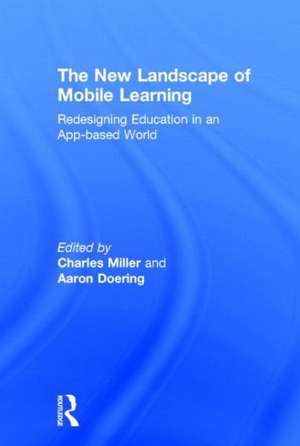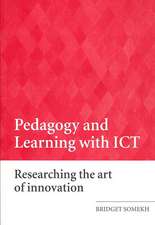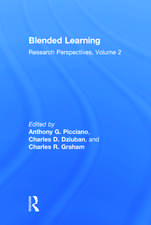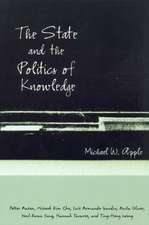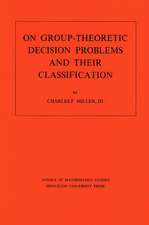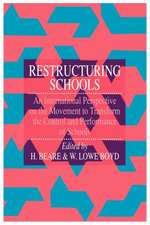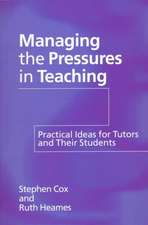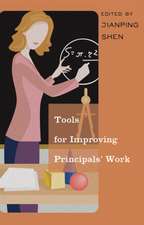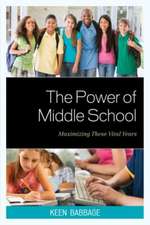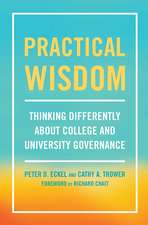The New Landscape of Mobile Learning: Redesigning Education in an App-Based World
Editat de Charles Miller, Aaron Doeringen Limba Engleză Hardback – 5 mar 2014
• An essential explanation of the emergence and role of Apps in education
• Design guidelines for educational Apps
• Case studies and student narratives from across the US describing successful App integration into both K-12 and Higher Education
• Robust, research-based evaluation criteria for educational Apps
Although many believe that Apps have the potential to create opportunities for transformative mobile education, a disparity currently exists between the individuals responsible for creating Apps (i.e. developers who often have little to no instructional experience) and the ultimate consumers in the classroom (i.e. K-20 educators and students). The New Landscape of Mobile Learning bridges this gap by illuminating critical design, integration, and evaluation narratives from leaders in the instructional design, distance education, and mobile learning fields.
| Toate formatele și edițiile | Preț | Express |
|---|---|---|
| Paperback (1) | 309.28 lei 6-8 săpt. | |
| Taylor & Francis – 6 mar 2014 | 309.28 lei 6-8 săpt. | |
| Hardback (1) | 1231.89 lei 6-8 săpt. | |
| Taylor & Francis – 5 mar 2014 | 1231.89 lei 6-8 săpt. |
Preț: 1231.89 lei
Preț vechi: 1502.31 lei
-18% Nou
Puncte Express: 1848
Preț estimativ în valută:
235.71€ • 246.13$ • 194.65£
235.71€ • 246.13$ • 194.65£
Carte tipărită la comandă
Livrare economică 15-29 aprilie
Preluare comenzi: 021 569.72.76
Specificații
ISBN-13: 9780415539234
ISBN-10: 0415539234
Pagini: 374
Ilustrații: 12 tables
Dimensiuni: 152 x 229 x 20 mm
Greutate: 0.85 kg
Ediția:New.
Editura: Taylor & Francis
Colecția Routledge
Locul publicării:Oxford, United Kingdom
ISBN-10: 0415539234
Pagini: 374
Ilustrații: 12 tables
Dimensiuni: 152 x 229 x 20 mm
Greutate: 0.85 kg
Ediția:New.
Editura: Taylor & Francis
Colecția Routledge
Locul publicării:Oxford, United Kingdom
Public țintă
Academic and Professional Practice & DevelopmentCuprins
Foreword
The failure of education’s first mobile device
Dr. Michael Searson
Preface
Section 1: The emerging role of mobile learning
Chapter 1 - Considering the potential of connected mobile learning
James Mundie and Dr. Simon Hooper
Chapter 2 - Paradigms of use, learning theory, and app design
Dr. Vanessa P. Dennen and Shuang Hao
Chapter 3 - Rich remote learning and cognition: Analog methods as models for newer technology
Dr. Brad Hokanson
Chapter 4 - The logic of the And: The nature of collaboration
Bobby George and June George
Chapter 5 - “Apping” its way into the future?: K12 English education
Dr. Cassandra Scharber
Section 2: Mobile Learning Design Guidelines and Frameworks
Chapter 6 - Seven design considerations for mobile learning applications
Lucas Lecheler and Bradford Hosack
Chapter 7 - The future of mobile media for learning
Dr. Seann M. Dikkers
Chapter 8 - A framework for mobile learning app design: DCALE
Donggil Song
Section 3: Mobile Learning Design and Development Narratives
Chapter 9 - Playing with Gravity: On Designing for Children
Bobby George and June George
Chapter 10 - HotSeat: Learning and designing on the move
Nathan Edwards and Jason Nyquist
Chapter 11 - The conceptualization, design, and development of a K-12 adventure learning App
Jeni Henrickson
Section 4: Mobile Learning Integration, Research, and Evaluation
Chapter 12 - Delineation of evaluation criteria for educational apps in STEM education
Dr. Brad McLain
Chapter 13 - Accessibility evaluation of iOS Apps for education
Kari Kumar and Dr. Ron Owston
Chapter 14 - Mobile data tools for teachers: A design-based research pilot study
Suzanne Rhodes
Chapter 15 - iPad-Didactics – Didactical designs for iPad-classrooms: Experiences from Danish schools and a Swedish university
Dr. Isa Jahnke and Dr. Swapna Kumar
Chapter 16 - Going mobile in science teacher education
Dr. Evrim Baran and Dr. Samia Khan
Chapter 17 - Librarian technology leadership in the adoption of iPads in a high school
Renada Geurtz and Carolyn Foote
Chapter 18 - iTeach and iLearn with iPads in secondary English language arts
Gregory Russell and Dr. Joan Hughes
Chapter 19 - Teacher resiliency (problem solving) and handheld computing
Dr. Rita Hagevik, Dr. Irina Falls, and Heather Higgins Lynn
Chapter 20 - iPad-Enabled experiments in an undergraduate physics laboratory
Dr. Roberto Ramos and Dr. Christopher Devers
Section 5: The Future of Mobile Learning
The failure of education’s first mobile device
Dr. Michael Searson
Preface
Section 1: The emerging role of mobile learning
Chapter 1 - Considering the potential of connected mobile learning
James Mundie and Dr. Simon Hooper
Chapter 2 - Paradigms of use, learning theory, and app design
Dr. Vanessa P. Dennen and Shuang Hao
Chapter 3 - Rich remote learning and cognition: Analog methods as models for newer technology
Dr. Brad Hokanson
Chapter 4 - The logic of the And: The nature of collaboration
Bobby George and June George
Chapter 5 - “Apping” its way into the future?: K12 English education
Dr. Cassandra Scharber
Section 2: Mobile Learning Design Guidelines and Frameworks
Chapter 6 - Seven design considerations for mobile learning applications
Lucas Lecheler and Bradford Hosack
Chapter 7 - The future of mobile media for learning
Dr. Seann M. Dikkers
Chapter 8 - A framework for mobile learning app design: DCALE
Donggil Song
Section 3: Mobile Learning Design and Development Narratives
Chapter 9 - Playing with Gravity: On Designing for Children
Bobby George and June George
Chapter 10 - HotSeat: Learning and designing on the move
Nathan Edwards and Jason Nyquist
Chapter 11 - The conceptualization, design, and development of a K-12 adventure learning App
Jeni Henrickson
Section 4: Mobile Learning Integration, Research, and Evaluation
Chapter 12 - Delineation of evaluation criteria for educational apps in STEM education
Dr. Brad McLain
Chapter 13 - Accessibility evaluation of iOS Apps for education
Kari Kumar and Dr. Ron Owston
Chapter 14 - Mobile data tools for teachers: A design-based research pilot study
Suzanne Rhodes
Chapter 15 - iPad-Didactics – Didactical designs for iPad-classrooms: Experiences from Danish schools and a Swedish university
Dr. Isa Jahnke and Dr. Swapna Kumar
Chapter 16 - Going mobile in science teacher education
Dr. Evrim Baran and Dr. Samia Khan
Chapter 17 - Librarian technology leadership in the adoption of iPads in a high school
Renada Geurtz and Carolyn Foote
Chapter 18 - iTeach and iLearn with iPads in secondary English language arts
Gregory Russell and Dr. Joan Hughes
Chapter 19 - Teacher resiliency (problem solving) and handheld computing
Dr. Rita Hagevik, Dr. Irina Falls, and Heather Higgins Lynn
Chapter 20 - iPad-Enabled experiments in an undergraduate physics laboratory
Dr. Roberto Ramos and Dr. Christopher Devers
Section 5: The Future of Mobile Learning
Recenzii
"The New Landscape of Mobile Learning helps educators, designers, and researchers to understand the changes in pedagogy and classroom practices needed to impact anytime, anywhere education."
--Professor Zane L. Berge, co-editor of Handbook of Mobile Learning
"The New Landscape of Mobile Learning is a far-ranging look at the role mobile technologies can play in education. With a wealth of ideas, frameworks, processes, and case studies, this book presents an impressive variety of perspectives to inspire reflection. This book will reward those looking to explore the breadth of possibilities that mobile education provides."
--Dr. Clark Quinn, author of The Mobile Academy: mLearning for Higher Education
"This is an impressive and comprehensive achievement and tackles a growing and powerful aspect of mobile learning with scholarship, experience, breadth and a sense of history and context. The emphasis is exactly where it needs to be . . . designing, developing and evaluating learning experiences in accessible and practical ways."
--John Traxler, Professor & Director, Learning Lab
--Professor Zane L. Berge, co-editor of Handbook of Mobile Learning
"The New Landscape of Mobile Learning is a far-ranging look at the role mobile technologies can play in education. With a wealth of ideas, frameworks, processes, and case studies, this book presents an impressive variety of perspectives to inspire reflection. This book will reward those looking to explore the breadth of possibilities that mobile education provides."
--Dr. Clark Quinn, author of The Mobile Academy: mLearning for Higher Education
"This is an impressive and comprehensive achievement and tackles a growing and powerful aspect of mobile learning with scholarship, experience, breadth and a sense of history and context. The emphasis is exactly where it needs to be . . . designing, developing and evaluating learning experiences in accessible and practical ways."
--John Traxler, Professor & Director, Learning Lab
Notă biografică
Charles Miller is an Associate Professor of Interaction Design in Learning Technologies and Co-Director of the Learning Technologies Media Lab at the University of Minnesota, USA.
Aaron Doering is an Associate Professor in Learning Technologies and Co-Director of the Learning Technologies Media lab at the University of Minnesota, USA.
Aaron Doering is an Associate Professor in Learning Technologies and Co-Director of the Learning Technologies Media lab at the University of Minnesota, USA.
Descriere
The New Landscape of Mobile Learning is the first book to provide a research-based overview of the largely untapped array of potential tools that m-Learning offers educators and students in face-to-face, hybrid, and distance education.
